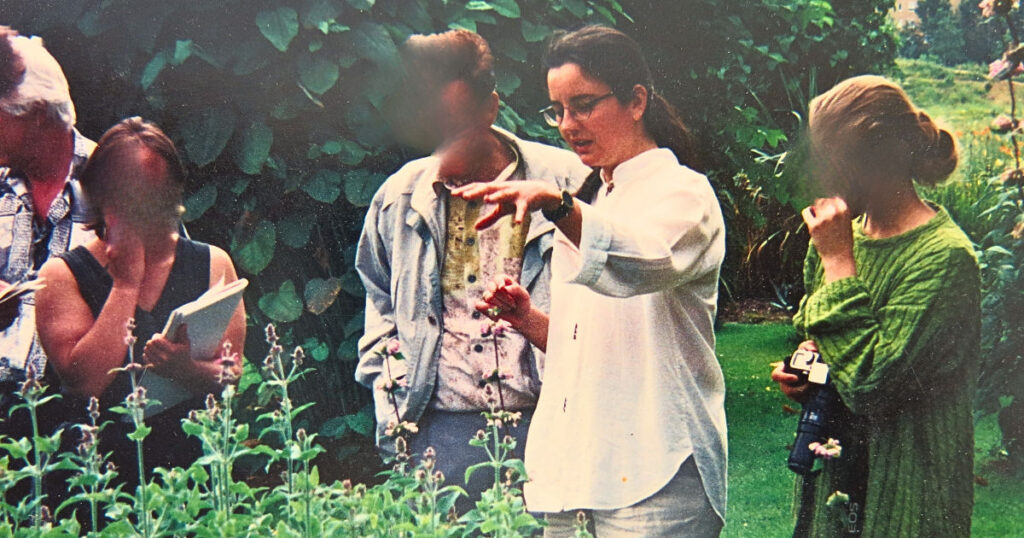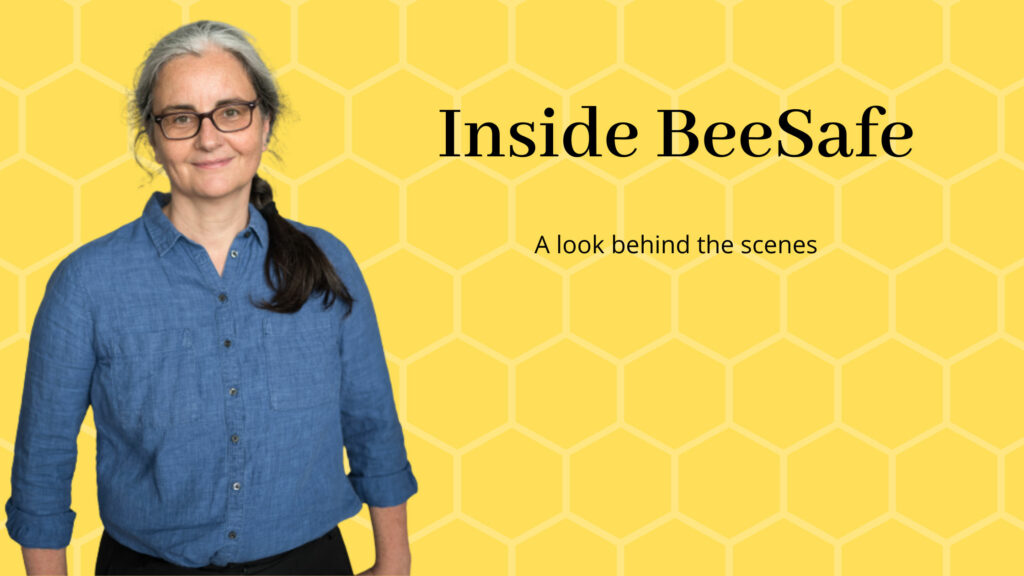I’ve been talking about bee science since I began my PhD. Actually, I financed it partly with talks and articles. The first two years, I didn’t have a grant. I had several small jobs at the State Institute of Apiculture at the University of Hohenheim, where I was a PhD student. I was the secretary of the institute, taught students and beekeepers, and became insight into the challenges of transferring knowledge.
That was a new world that opened when I came to the institute in Hohenheim. The “bee institutes” in Germany (there are seven of them in different regions) do applied research. One of their primary tasks is training and consultancy for beekeepers. I came from a pure academic setting, so this was new to me. And I liked it. The director of the institute, Dr. Peter Rosenkranz, was a good communicator himself and supported his students to do the same.
So, it began with talks about solitary bees and bumblebees. Those were the origins of my love for bees, after all. I did a “wild bee course” in that time and also contributed a little key for the most common species in trap nests. They still use it on the site of the institute if you’re interested (in German). In this time, I noticed how much I enjoy teaching and making complex things accessible.

How I began talking about bee science – my first “wild bee course” at the State Institute of Apiculture in Hohenheim (in 1998). The gardens around the university have a plethora of plants and different bee species.
Later, I began to talk about varroa (the subject of my PhD thesis, after all…) and then about various subjects all about bees. There was a time that I spent almost every weekend giving a talk somewhere. When I finally got a grant and the institute got a real secretary, I left all those little jobs behind. But I continued doing talks and writing in beekeeping journals.
Talking about bees and science
In this time, I took on all sorts of subjects, very often those which were related to bee biology and the connection between the “theory” and the practical part of beekeeping. Making these connections is extremely important, in my opinion. There’s a common belief that there’s a gap between what scientists do and what the “practice” shows. That’s not true. They’re two sides of the same coin.
Obviously, there are parts of science that may have a greater distance to everyday life. Or appear to. The research on certain proteins in the bees’ haemolymph (the bee blood) may seem not related to what a beekeeper does every day. However, if these proteins are involved in the immune response of the bees against diseases, it already sounds different, doesn’t it?
Even more so, if a beekeeper gets some tips on how to maintain these proteins at a healthy level through good bee nutrition. There’s plenty of research on how diverse pollen sources help the bees to stay healthy. Which proteins are involved in this maybe isn’t as important for the beekeeper. But it’s important to have those data to give good recommendations. As I said, two sides of the same coin.
The curse of knowledge…
One of the best compliments I ever got was an older beekeeper who told me after a talk about GMOs: “Finally someone from academia that talks with plain words!”. The most important thing in communication is to know whom you’re talking to. If I talk to other scientists, I’ll say the same things with different words than if I’m talking to a beekeeper. Or someone that just asks me “is it true that bees are declining?” because they heard it somewhere for the first time.
Not everyone is able to do that. That doesn’t mean that they don’t care, but it’s difficult to change your perspective. Some things are so obvious for someone who does a certain job for many years, that it even doesn’t come to their mind that somebody else may not know. That’s what’s called the “curse of knowledge”. I don’t know where this comes from, I heard it somewhere. But it says what happens to many scientists when they speak to non-scientists: They don’t consider that others may not know something they consider completely trivial.
This happens also when talking about bee science. When I was in Bulgaria this spring, I had prepared a talk about the present and future challenges for beekeeping. The evening before, when talking to the organizer of the conference, I noticed that this wasn’t what the beekeepers there needed from me. I was told about the need of proper varroa treatments and everything related to that. So, I changed my talk. Because I wanted it to be useful.
… and the pitfalls that come from this
Fortunately, it doesn’t happen very often that I have to change my talk. Maybe I misunderstood the indications I got when we talked about what they needed. However, I’ve never given the same talk twice, though I may have exactly the same presentation. Because I try to see the reactions of my audience and modify what I’m saying and how I say it accordingly.
If you don’t consider the curse of knowledge and don’t adapt your language, that’s what creates this belief of scientists being far apart from “real life”. Or that scientists are arrogant. Both of these things may be the case sometimes. But certainly not always.
On the other hand, beekeepers with this idea of “theory and practice are two different things, is very prone of falling into scam traps. There are a lot of “experts” out there who claim to have simple solutions. To very complex issues. How should beekeepers (or anybody else) know if nobody explained the context to them in a way that they understand? That’s why I say that making complex things accessible doesn’t mean simplifying.
Talking about bee science for healthier bees
Scammers know how to use a small real core and build a huge ideology around it. They then claim that scientists just don’t want to tell you the truth. That they don’t know anything and they’re just corrupted by the industry. Conspiracy theories exist from the beginning of humanity, I’m pretty sure. With social media, they spread much faster than they ever did before. And they don’t skip beekeeping and bee science.
It’s easier to believe in a miracle cure against varroa than putting in the work. It’s difficult to take a step back and consider if this “simple and 100% safe solution” is plausible. You need knowledge to do that. Offered without judgement. Again: How should they know if nobody taught them? The very first step, however, is to know that there is something to know.
As I think that the lack of knowledge and education is one of the main causes of many (if not most) problems, I’m very passionate about talking about bee science. That’s why I still do it. It’s my special mission. Social media and online courses have again opened a world to do that and reach much more people. Nowadays, I teach not only beekeepers, but also farmers, vets, and the “general public”. And in many different ways – by talking and writing, in real life or online.



What were some of the key lessons you learned about beekeeping practices and sustainability at the institute?
Maybe the most important one: adapt the way you’re talking to the audience you have in front of you. And don’t take anything for granted, anything that they “should know”, is trivial, or something like that. It’s not about your person as a teacher, it’s about the person you’re trying to teach. In short: humbleness.